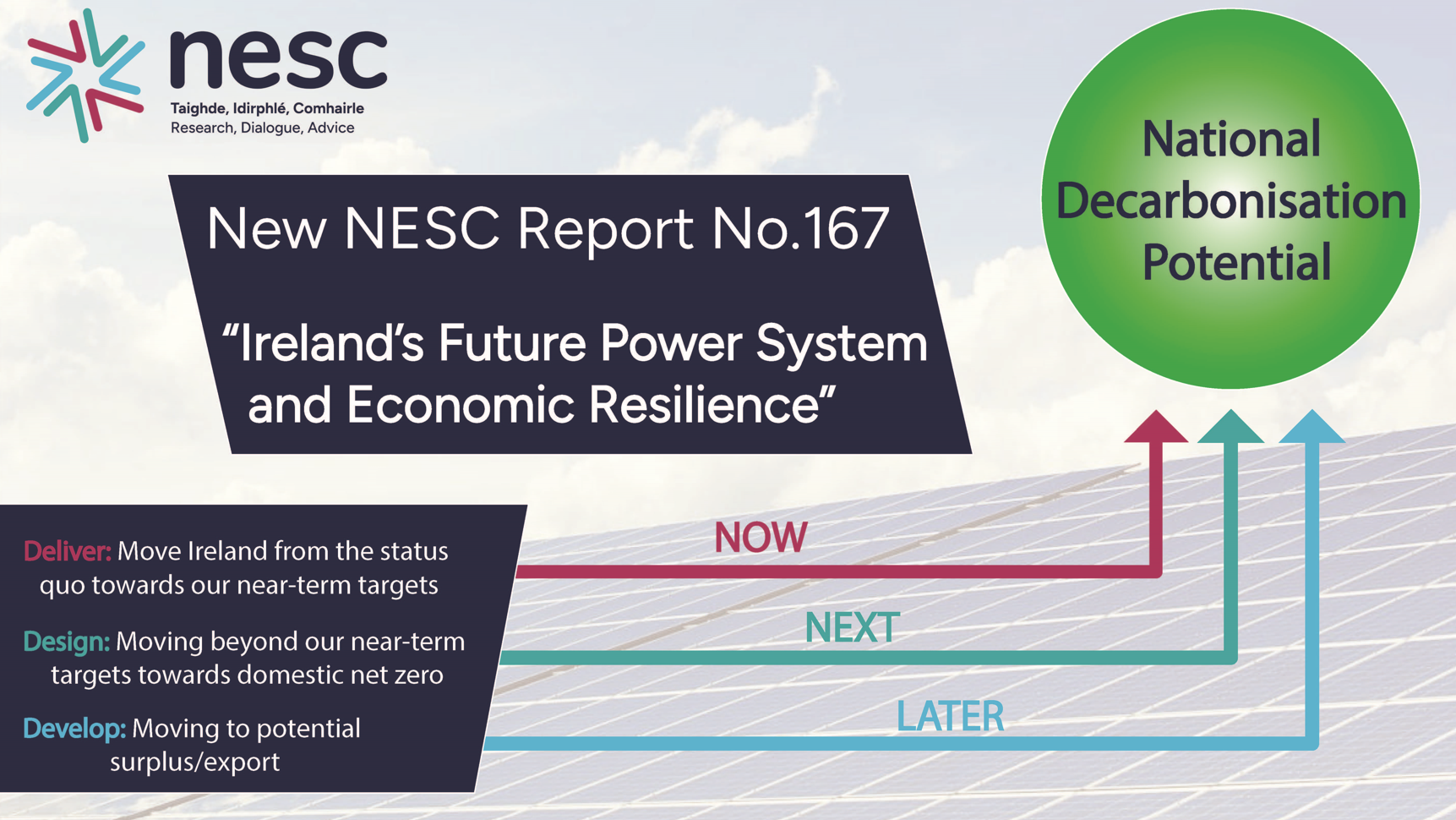You are here: Home > News & Events > NESC report shows Action is Needed Now to ‘Clear the Fog’ and Progress Ireland’s Energy Transition
NESC report shows Action is Needed Now to ‘Clear the Fog’ and Progress Ireland’s Energy Transition
- 18 April 2025
- Topics: Economic Energy and renewables
- Types: Press Releases

- Much of Ireland’s policy for transition in the power sector is headed ‘into fog’.
- Key actors are not ‘on the same page’ from a strategic standpoint.
- Actions must be taken now, next, and later to reinforce Ireland’s energy transition and economic resilience, and to help us reach our national decarbonisation potential.
18 April 2025, Dublin, Ireland: A new research report published by the National Economic and Social Council (NESC) examines four key aspects of Ireland’s energy transition which are important for national economic resilience: enterprise opportunities, the reliability of power supply, the cost of energy, and the export of energy. This report presents a suite of actions to work through immediately to progress Ireland’s power sector transition.
“Ireland aims to transform our power system over the next 25 years by reducing fossil fuel use and ramping up the use of solar and wind energy. This is key to addressing climate change,” said Dr Cathal FitzGerald, Senior Analyst at NESC. “However, NESC’s research reveals uncertainty about the impact on our economic resilience in terms of energy reliability, price, jobs, and export. These in turn highlight broader issues to be resolved and a strong imperative for action,” he stated.
Based on in-depth research and extensive consultations with key actors, the Council identifies four primary risks to policymaking and to the transition narrative.
- First, the Council finds a complex landscape of assessments of enterprise opportunities. There is no single, comprehensive estimate available to policymakers of the sales, exports, and jobs etc. that can be expected from delivering transition targets.
- Second, NESC reveals a lack of clarity and certainty about the future reliability of energy supply. Reliability may worsen over periods of the transition, if not addressed, and there is also no clear visibility of the power system’s reliability beyond 2032.
- Third, the Council finds that the transition may result in higher, not lower, electricity prices, challenging national competitiveness and the transition narrative. Clarity is needed regarding the total system cost of transition in the power sector and the distribution of those costs.
- Fourth, NESC finds that key questions about renewable energy capacity requirements, the rationale for surplus power generation, its optimal use, price competitiveness, and the method of energy export remain unanswered.
Dr FitzGerald added: “It is important that these findings do not lead to paralysis. Our work finds that much of Ireland’s policy action for transition in the power sector is headed into fog. Visibility and certainty are low, and key actors are not on the same page from a strategic standpoint. But the energy transition is of paramount importance and must be progressed despite all the complexities involved. The cost of inaction would be enormous and devastating.
“Ireland’s decarbonisation potential includes the ability to meet all, or almost all, of our power demand from renewable energy sources – to reach domestic net zero in other words. There is also the prospect of producing surplus clean energy to power enterprise and spur new opportunities, and even the possibility of exporting surplus clean energy, if proven practical and viable.
“The Council’s report sets out actions to be taken now, next, and later to help us realise that potential. Right now, we need to improve the conditions for clean energy infrastructure delivery – the planning and consents, the grid, skills, finance, and ports, shipping, and supply chains. A new institutional framework can help make this happen and provide strategic direction.
“Next, we need to fill in the knowledge gaps revealed in the Council’s research. Ireland also needs to demonstrate sustainable demand for renewable power that matches national targets, and to ensure the expected jobs and opportunities arise here.
“Later, to move beyond domestic net zero, action will be needed to produce competitively priced energy for international markets, to develop a viable export method, and to successfully manage security concerns.”
On the publication of the report, Dr Larry O’Connell, Director of NESC, added that: “The Council believes there is an urgent need to address the strategic gaps identified in this report in a way that reinforces both the energy transition and economic resilience, while moving Ireland forward. NESC’s recommended actions represent an agenda for the policy system to work through immediately to make transition in Ireland’s power sector more likely, and more likely to be successful.”
To read the report in full please click here.
ENDS
For further information, contact:
Marie Lynch, Carr Communications,
e: marie@carrcommunications.ie | m: 087 973 0522


